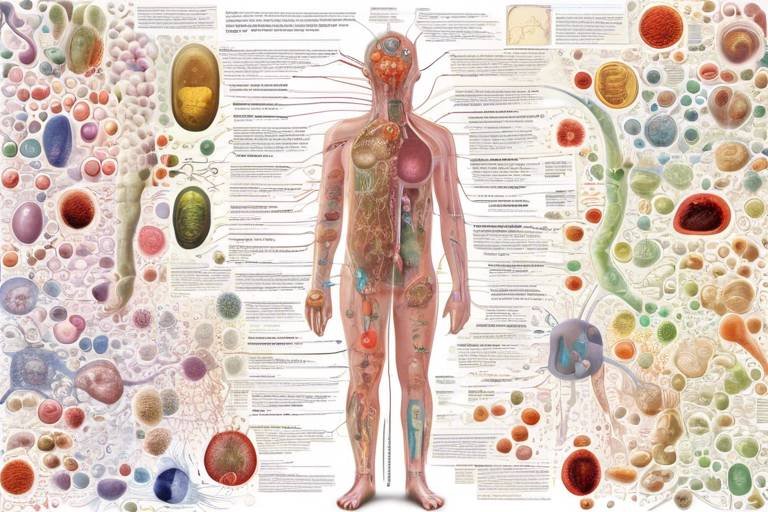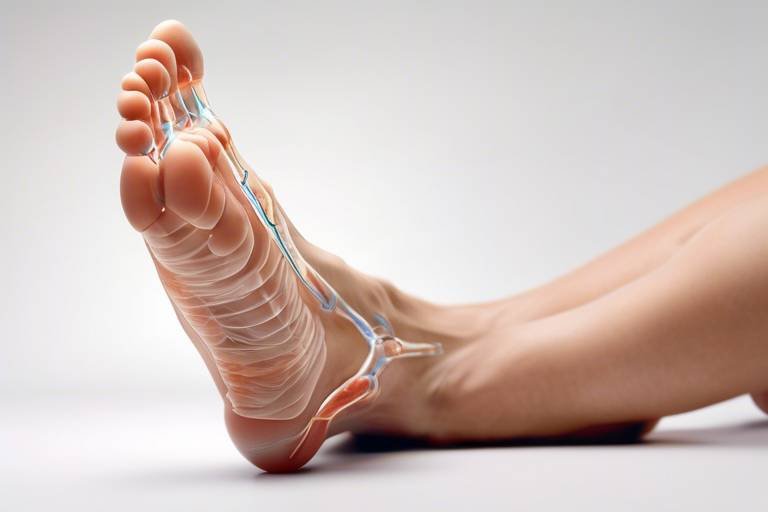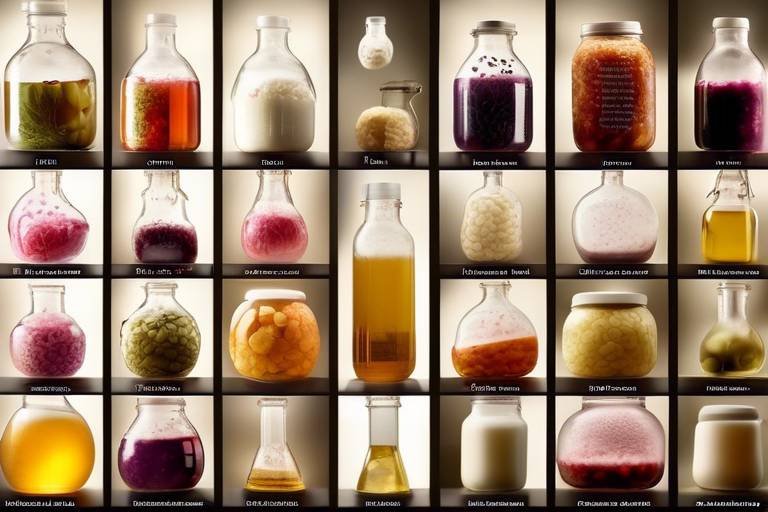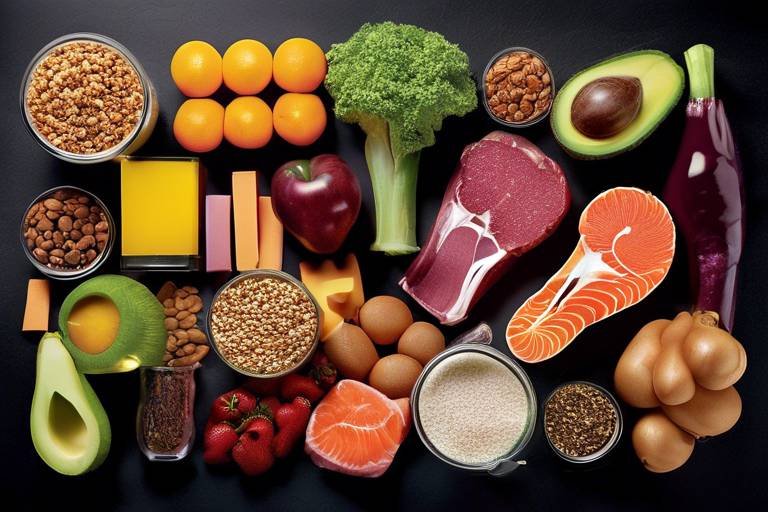How Gratitude Affects Relationships - The Science Explained
Gratitude is more than just a polite "thank you." It's a powerful emotion that can transform our relationships in profound ways. When we express gratitude, we not only acknowledge the kindness of others but also strengthen our connections with them. Imagine gratitude as a vibrant thread weaving through the fabric of our interactions, enhancing the quality of our relationships and creating a tapestry of appreciation and love. In this article, we will explore the profound impact of gratitude on interpersonal relationships, highlighting scientific findings and practical applications that can enhance our connections through appreciation and positive reinforcement.
Understanding the psychological benefits of gratitude reveals its role in enhancing emotional well-being and fostering stronger relationships. When we practice gratitude, it shifts our focus from what we lack to what we have, creating a more positive outlook on life. This shift in mindset not only improves our mood but also influences how we perceive and interact with others. Studies show that individuals who regularly express gratitude tend to have more satisfying relationships. They are more likely to engage in prosocial behaviors, such as helping and supporting others, which creates a cycle of positivity and connection.
Research indicates that gratitude can trigger physiological responses that promote bonding. When we express or receive gratitude, our brains release a cocktail of chemicals that enhance our feelings of connection. This section examines the biological mechanisms at play when we express and receive gratitude in our relationships. Understanding these mechanisms can help us appreciate the depth of gratitude's impact on our emotional and physical well-being.
Gratitude activates specific neurotransmitters in the brain, such as dopamine and serotonin, which are linked to feelings of happiness and bonding. When we feel grateful, these neurotransmitters flood our system, creating a sense of joy and connection. This response not only makes us feel good but also encourages us to engage with those around us, reinforcing our relationships. The neurochemical pathways involved in gratitude are fascinating, as they illustrate how our emotions are deeply intertwined with our biology.
Often referred to as the love hormone, oxytocin is released during acts of gratitude, enhancing feelings of trust and connection. This hormone plays a significant role in relationship dynamics, as it promotes bonding and intimacy. When we express gratitude, we not only uplift ourselves but also create a safe space for others to feel valued and appreciated. This mutual exchange fosters deeper connections and strengthens the emotional ties that bind us together.
Practicing gratitude can lower stress levels, contributing to healthier relationships. When we focus on the positive aspects of our lives and express appreciation for those around us, we activate a relaxation response in our bodies. This leads to reduced cortisol levels, which can help mitigate the effects of stress on our relationships. With less stress, we are more likely to communicate effectively and provide emotional support to our partners, creating a nurturing environment for our connections to thrive.
Gratitude can play a crucial role in resolving conflicts by promoting empathy and understanding. When disagreements arise, expressing gratitude can help us step back and appreciate the other person's perspective. This acknowledgment can diffuse tension and open the door to constructive dialogue. Strategies for using gratitude to navigate disagreements effectively include:
- Taking a moment to reflect on what you appreciate about the other person.
- Verbalizing your gratitude during a conflict to foster a more positive atmosphere.
- Using gratitude as a tool to remind both parties of their shared goals and values.
Implementing daily practices of gratitude can significantly enhance relationships. By actively fostering a culture of appreciation in our lives, we can create stronger bonds with those around us. Here are some actionable tips for individuals and couples to cultivate gratitude:
Keeping a gratitude journal encourages reflection on positive experiences and relationships. This practice can strengthen bonds and enhance overall relationship satisfaction. By regularly noting what we are grateful for, we train our minds to focus on the good, which can lead to a more positive outlook on our relationships.
Verbal expressions of gratitude can deepen connections and affirm relationships. Simple phrases like "I appreciate you" or "Thank you for being there for me" can go a long way in making others feel valued. Effective ways to communicate appreciation include:
- Sending a thoughtful text or note.
- Publicly acknowledging someone's contribution in a group setting.
- Regularly checking in with loved ones to express your gratitude for their presence in your life.
Q: How often should I express gratitude to others?
A: Regularly expressing gratitude can enhance your relationships. Aim to make it a daily habit, whether through verbal acknowledgment or written notes.
Q: Can gratitude really improve my mental health?
A: Yes! Numerous studies have shown that practicing gratitude can lead to improved mental health, reduced stress, and increased happiness.
Q: What if I find it hard to feel grateful?
A: It's normal to struggle with gratitude at times. Try focusing on small, everyday positives, and consider starting a gratitude journal to help shift your mindset.

The Psychology of Gratitude
Gratitude isn't just a fleeting emotion; it's a powerful psychological tool that can transform our relationships and overall emotional well-being. When we take a moment to appreciate the good in our lives and the people around us, we activate a chain reaction of positive feelings. This phenomenon can be likened to a ripple effect, where one small act of gratitude can lead to a wave of kindness and connection. But how exactly does this work? Let's dive into the fascinating psychology behind gratitude.
Firstly, gratitude shifts our focus from what we lack to what we have. This shift in perspective can significantly enhance our mood and outlook on life. Research shows that individuals who regularly practice gratitude report higher levels of happiness and lower levels of depression. By consciously recognizing the positive aspects of our relationships, we begin to foster a deeper emotional connection with others. This is not just about feeling good; it’s about cultivating a mindset that prioritizes appreciation.
Moreover, gratitude fosters empathy and reduces aggression. When we express gratitude, we acknowledge the efforts of others, which can lead to stronger bonds and improved conflict resolution. Think about it: when was the last time you felt grateful towards someone? That feeling likely encouraged you to be more understanding and patient with them. It's as if gratitude acts as a lubricant for the gears of our social interactions, making it easier for us to navigate the complexities of human relationships.
In addition, gratitude can enhance our self-esteem. When we appreciate others, we often find ourselves feeling more valued and respected in return. This reciprocal nature of gratitude creates a positive feedback loop, where both parties feel uplifted and connected. A study published in the journal Emotion found that individuals who practice gratitude regularly experience greater self-worth, which in turn leads to healthier and more fulfilling relationships.
To further illustrate the psychological benefits of gratitude, consider the following points:
- Improved Mental Health: Regular gratitude practice can reduce symptoms of anxiety and depression.
- Enhanced Relationships: Expressing gratitude can strengthen bonds and increase relationship satisfaction.
- Increased Resilience: Grateful individuals tend to bounce back more quickly from setbacks.
In essence, gratitude acts as a catalyst for positive emotions and healthier relationships. It encourages us to step outside of ourselves and recognize the contributions of others, which is essential for building strong interpersonal connections. So, the next time you feel a wave of gratitude, don’t just brush it aside. Embrace it, express it, and watch how it transforms your relationships and your life.

The Biological Basis of Gratitude
When we talk about gratitude, it’s not just a warm, fuzzy feeling; there's a fascinating biological orchestra playing behind the scenes. Research has shown that gratitude can trigger a cascade of physiological responses that promote bonding and enhance our relationships. At the heart of this biological phenomenon are various neurotransmitters and hormones that facilitate emotional connections. So, let’s dive deeper into how these biological mechanisms work and why they matter in our everyday interactions.
First off, gratitude is not merely a social nicety; it has profound implications for our mental and physical health. When we express gratitude, our brains release a cocktail of neurotransmitters, including dopamine and serotonin. These chemicals are known as "feel-good" neurotransmitters because they play a crucial role in regulating mood and emotions. For instance, dopamine is linked to feelings of pleasure and reward, while serotonin helps to stabilize our mood. Together, they create a sense of happiness that can enhance our perception of relationships, making us feel more connected to those around us.
Understanding the specific neurotransmitters involved in gratitude can offer insights into why expressing appreciation is so powerful. When we acknowledge someone's efforts or kindness, our brain's reward system lights up, reinforcing positive feelings. This is akin to a feedback loop where gratitude not only makes us feel good but also motivates us to nurture our relationships further. Imagine this process as planting seeds of appreciation; the more we water them with gratitude, the more they grow into strong, flourishing connections.
Another key player in the biological basis of gratitude is oxytocin, often dubbed the "love hormone." It’s released during moments of gratitude and affection, enhancing feelings of trust and connection. Think of oxytocin as the glue that holds relationships together. When we express gratitude, oxytocin levels rise, making us feel closer to others and more willing to engage in positive interactions. This hormonal boost can be particularly significant in romantic relationships, where trust and emotional intimacy are essential.
But the benefits of gratitude don’t stop at enhancing feelings of love and trust; they extend to stress reduction as well. Engaging in gratitude practices can lower cortisol levels, the hormone associated with stress. Lower stress means better communication and emotional support among partners. When we feel less stressed, we are more likely to approach our loved ones with an open heart and a clear mind, allowing for healthier interactions. This is crucial in maintaining the balance and harmony that every relationship strives for.
In summary, the biological basis of gratitude is a complex interplay of neurotransmitters and hormones that work together to foster stronger connections. By understanding these mechanisms, we can appreciate how simple acts of gratitude can lead to profound changes in our relationships. Just like a well-tuned orchestra, each element plays its part, creating a symphony of emotional well-being and relational satisfaction.
- What are the main neurotransmitters involved in gratitude? The primary neurotransmitters are dopamine and serotonin, which contribute to feelings of happiness and bonding.
- How does oxytocin affect relationships? Oxytocin enhances feelings of trust and connection, acting as a bonding agent in relationships.
- Can gratitude reduce stress? Yes, practicing gratitude can lower cortisol levels, leading to reduced stress and healthier relationships.
- How can I incorporate gratitude into my daily life? Simple practices like keeping a gratitude journal or verbally expressing appreciation can significantly enhance your relationships.

Neurotransmitters and Gratitude
Gratitude isn't just a warm, fuzzy feeling; it has a profound impact on our brains, thanks to the complex interplay of neurotransmitters. When we express or receive gratitude, our brain releases a cocktail of chemicals that can enhance our mood and strengthen our bonds with others. Two key players in this process are dopamine and serotonin. These neurotransmitters are often referred to as the "feel-good" chemicals because they are closely linked to feelings of happiness and well-being.
Dopamine is often associated with the brain's reward system. When we do something that makes us feel good, like expressing gratitude towards a friend or receiving thanks for our efforts, dopamine is released, creating a sense of pleasure and satisfaction. This not only reinforces our positive behavior but also encourages us to continue expressing gratitude, creating a virtuous cycle of appreciation. Similarly, serotonin plays a crucial role in regulating mood and social behavior. When we feel grateful, serotonin levels increase, which can lead to improved emotional stability and a greater sense of connection with those around us.
But how exactly do these neurotransmitters work together to enhance our relationships? Let's break it down:
| Neurotransmitter | Function | Impact on Relationships |
|---|---|---|
| Dopamine | Reward and pleasure | Encourages positive interactions and reinforces bonding |
| Serotonin | Mood regulation | Enhances emotional stability and connection |
By understanding these neurochemical pathways, we can appreciate how gratitude not only enriches our own lives but also strengthens our relationships with others. When we express gratitude, we are not just acknowledging the kindness of others; we are participating in a biochemical dance that fosters deeper connections and enhances our overall emotional well-being.
Moreover, the act of practicing gratitude can become a powerful tool for enhancing our relationships. Imagine a couple who regularly expresses appreciation for each other. Over time, they are likely to experience increased levels of both dopamine and serotonin, leading to a more fulfilling and harmonious relationship. Conversely, when gratitude is absent, the opposite can occur: feelings of resentment, frustration, and disconnection can arise, fueled by lower levels of these essential neurotransmitters.
In conclusion, the science behind neurotransmitters and gratitude reveals a fascinating connection between our emotional states and our relationships. By embracing gratitude in our daily lives, we can not only uplift our spirits but also create stronger, more meaningful connections with those we care about. So, the next time you feel grateful, remember that you are not just expressing a sentiment; you are also engaging in a powerful neurochemical process that benefits both you and your relationships.
- What are neurotransmitters? Neurotransmitters are chemical messengers in the brain that transmit signals between nerve cells, influencing mood, behavior, and emotions.
- How does gratitude affect mood? Gratitude can boost the release of dopamine and serotonin, which are linked to feelings of happiness and emotional well-being.
- Can practicing gratitude improve relationships? Yes, regularly expressing gratitude can strengthen bonds and enhance emotional connections between individuals.
- What is the best way to practice gratitude? Keeping a gratitude journal, expressing thanks verbally, and performing acts of kindness are effective ways to cultivate gratitude.

The Role of Oxytocin
Often referred to as the love hormone, oxytocin plays a pivotal role in shaping our relationships and enhancing emotional connections. This fascinating hormone is released during moments of intimacy, trust, and bonding, significantly influencing how we interact with others. When we express gratitude or receive it, our bodies release oxytocin, which promotes feelings of warmth and attachment. Imagine oxytocin as a social glue that binds us to our loved ones, fostering a sense of belonging and security.
The effects of oxytocin extend beyond mere emotional responses; they also impact our physiological state. Elevated oxytocin levels can lead to reduced heart rates and lower blood pressure, creating a calming effect that is essential during moments of stress or conflict. This is particularly valuable in relationships, where understanding and empathy are crucial. When we feel safe and connected, we are more likely to communicate openly and resolve conflicts amicably. In essence, oxytocin not only helps us feel good but also equips us with the tools to navigate the complexities of interpersonal dynamics.
Moreover, the presence of oxytocin can enhance our ability to empathize with others. When we express gratitude, we invite a reciprocal response, creating a cycle of appreciation that reinforces our bonds. This hormonal exchange can lead to a deeper understanding of each other's feelings and perspectives, making it easier to support one another through life's challenges. Think of oxytocin as the bridge that connects our hearts, allowing us to walk alongside each other in both joyous and trying times.
To illustrate the importance of oxytocin in relationships, consider the following table that summarizes its effects:
| Effect of Oxytocin | Description |
|---|---|
| Increased Trust | Facilitates feelings of safety and security in relationships. |
| Enhanced Empathy | Improves our ability to understand and share the feelings of others. |
| Stress Reduction | Lowers cortisol levels, promoting a sense of calm during conflicts. |
| Strengthened Bonds | Encourages deeper emotional connections and commitment. |
In conclusion, oxytocin is more than just a hormone; it's a vital component in the tapestry of our relationships. By fostering gratitude and appreciation, we can stimulate its release, enhancing our connections with others and creating a more supportive and loving environment. So, the next time you express gratitude, remember that you are not just acknowledging someone's efforts; you are also nurturing the bonds that keep your relationships thriving.
- What is oxytocin? Oxytocin is a hormone that plays a crucial role in social bonding, emotional regulation, and reproductive functions.
- How does gratitude affect oxytocin levels? Expressing and receiving gratitude can trigger the release of oxytocin, enhancing feelings of connection and trust.
- Can oxytocin improve conflict resolution? Yes, by promoting empathy and reducing stress, oxytocin can help facilitate better communication and understanding during conflicts.

love hormone,
This article explores the profound impact of gratitude on interpersonal relationships, highlighting scientific findings and practical applications that enhance connections through appreciation and positive reinforcement.
Understanding the psychological benefits of gratitude reveals its role in enhancing emotional well-being and fostering stronger relationships. This section delves into how gratitude influences our thoughts and feelings towards others.
Research indicates that gratitude can trigger physiological responses that promote bonding. This section examines the biological mechanisms at play when we express and receive gratitude in our relationships.
Gratitude activates specific neurotransmitters in the brain, such as dopamine and serotonin, which are linked to feelings of happiness and bonding. This subsection explores the neurochemical pathways involved.
Often referred to as the love hormone, oxytocin is released during acts of gratitude, enhancing feelings of trust and connection. Have you ever noticed how a simple "thank you" can make you feel more connected to someone? That’s oxytocin at work! This powerful hormone plays a crucial role in fostering intimacy and emotional bonds between individuals. When we express gratitude, our brain releases oxytocin, which not only makes us feel good but also encourages us to continue nurturing our relationships.
Interestingly, oxytocin is not just released when we receive gratitude; it flows when we give it as well. This reciprocal exchange creates a cycle of positivity that strengthens the ties we have with others. Imagine a warm hug from a friend after a long day – that surge of warmth and connection you feel is largely due to oxytocin. It’s like a magic glue that holds relationships together, making us feel more secure and loved.
Moreover, the effects of oxytocin extend beyond just emotional bonding. Studies have shown that higher levels of this hormone can lead to:
- Increased empathy: We become more attuned to others' feelings.
- Better communication: We express ourselves more clearly and effectively.
- Heightened trust: We are more likely to open up and share with others.
This hormonal reaction is a beautiful reminder of how interconnected our emotional states and physiological responses are. By practicing gratitude, we can stimulate oxytocin release, enhancing not just our own happiness but also the happiness of those around us. It’s a win-win situation! So, the next time you feel grateful, remember that you’re not just benefiting yourself; you’re also strengthening the bonds with those you appreciate.
Practicing gratitude can lower stress levels, contributing to healthier relationships. This section focuses on how reduced stress fosters improved communication and emotional support among partners.
Gratitude can play a crucial role in resolving conflicts by promoting empathy and understanding. This subsection highlights strategies for using gratitude to navigate disagreements effectively.
Implementing daily practices of gratitude can significantly enhance relationships. This section provides actionable tips for individuals and couples to foster a culture of appreciation in their lives.
Keeping a gratitude journal encourages reflection on positive experiences and relationships. This part discusses how this practice can strengthen bonds and enhance overall relationship satisfaction.
Verbal expressions of gratitude can deepen connections and affirm relationships. This subsection explores effective ways to communicate appreciation to strengthen interpersonal ties.
- What is gratitude?
Gratitude is the quality of being thankful and the readiness to show appreciation for and to return kindness. - How does gratitude affect relationships?
Gratitude fosters positive emotions, enhances social bonds, and promotes trust and empathy, all of which are essential for healthy relationships. - Can gratitude improve mental health?
Yes, practicing gratitude has been linked to lower levels of depression and anxiety, leading to improved overall mental well-being. - What are some simple ways to practice gratitude?
Some effective ways include keeping a gratitude journal, expressing appreciation verbally, and performing acts of kindness.

oxytocin is released during acts of gratitude, enhancing feelings of trust and connection. This part discusses its significance in relationship dynamics.
When we talk about relationships, one term that often pops up is "oxytocin." Known as the love hormone, oxytocin is a fascinating player in the game of human connection. It's released during moments of gratitude, which can significantly enhance feelings of trust and connection between individuals. But what does that really mean? Well, think of oxytocin as the glue that holds relationships together. When you express gratitude, whether it's a simple "thank you" or a heartfelt note, your brain releases this hormone, creating a warm, fuzzy feeling that can deepen your bond with others.
This release of oxytocin during acts of gratitude is not just a random occurrence; it plays a pivotal role in relationship dynamics. When we feel appreciated and valued, we are more likely to reciprocate those feelings. It’s like a cycle of positivity—one act of gratitude leads to another. Imagine you're at a coffee shop, and the barista goes out of their way to make your drink just right. You express your gratitude, and in return, they smile and feel appreciated. This small interaction can create a ripple effect, fostering a sense of community and connection.
Moreover, oxytocin is linked to reducing anxiety and promoting feelings of safety. When you feel safe in a relationship, you're more likely to open up and share your thoughts and feelings, which can lead to deeper connections. For instance, think about a couple who regularly expresses gratitude towards each other. They are not just acknowledging each other's efforts; they are also reinforcing their emotional bond. This practice can lead to enhanced trust, making it easier to navigate challenges together.
In the realm of relationships, the significance of oxytocin cannot be overstated. It acts as a catalyst for emotional bonding, making us more empathetic and understanding towards one another. When we engage in acts of gratitude, we are essentially fueling the production of oxytocin, thereby enhancing our capacity to connect with others. This is particularly important in romantic relationships, where trust and emotional intimacy are crucial. As couples express gratitude, they not only strengthen their bond but also create a nurturing environment where both partners feel valued and respected.
To summarize, the role of oxytocin in gratitude is a powerful reminder of how our emotional expressions can shape our relationships. By fostering an environment of appreciation, we can enhance trust and connection, paving the way for healthier, happier relationships. So, the next time you feel grateful, remember that you’re not just expressing a sentiment; you’re also contributing to a deeper, more meaningful connection with those around you.
- What is oxytocin? Oxytocin is a hormone that plays a crucial role in social bonding, sexual reproduction, and during and after childbirth.
- How does gratitude affect relationships? Expressing gratitude can enhance feelings of trust, connection, and overall relationship satisfaction.
- Can gratitude improve mental health? Yes, practicing gratitude has been shown to reduce stress and anxiety, contributing to better mental health.
- What are some ways to express gratitude? Simple acts like saying "thank you," writing notes, or giving compliments can effectively express gratitude.

Stress Reduction through Gratitude
Have you ever noticed how a simple "thank you" can turn your day around? It’s not just a polite gesture; it’s a powerful tool for reducing stress and enhancing our emotional well-being. When we practice gratitude, we shift our focus from what’s going wrong in our lives to what’s going right. This shift in perspective can significantly lower stress levels and promote a sense of calm and contentment.
Research shows that gratitude can trigger a cascade of positive emotional responses in our brains, leading to lower cortisol levels, which is the hormone primarily associated with stress. When we express gratitude, our body releases feel-good hormones like dopamine and serotonin, creating a sense of happiness and relaxation. This is akin to finding a hidden treasure in your daily routine; instead of focusing on the burdens of life, you start appreciating the little joys that surround you.
Moreover, gratitude can foster a more supportive and understanding atmosphere in relationships. When we express appreciation towards our partners, friends, or family members, we cultivate an environment where open communication thrives. This is especially important during stressful times when misunderstandings can easily arise. By acknowledging and appreciating the efforts of those around us, we can build a strong foundation of trust and support, making it easier to navigate through challenges together.
Here are some practical ways gratitude can help reduce stress:
- Improved Communication: Openly expressing gratitude encourages honest dialogue, which can help resolve conflicts before they escalate.
- Enhanced Emotional Support: When you appreciate someone's presence, they are more likely to be there for you during tough times.
- Positive Reinforcement: Recognizing the good in others reinforces their positive behaviors, creating a cycle of appreciation that strengthens bonds.
In essence, practicing gratitude is like watering a plant; it nurtures the roots of our relationships and helps them flourish. Whether it’s through a heartfelt note, a simple text, or a verbal expression of thanks, making gratitude a regular part of your interactions can lead to a significant reduction in stress, promoting healthier and more fulfilling relationships.
- How can I start practicing gratitude? Begin by keeping a gratitude journal where you write down three things you are thankful for each day.
- Can gratitude really reduce stress? Yes, studies have shown that expressing gratitude can lower cortisol levels and promote feelings of happiness and relaxation.
- What are some ways to express gratitude? You can express gratitude through verbal affirmations, handwritten notes, or even small acts of kindness.

Gratitude in Conflict Resolution
When conflicts arise in relationships, it can feel like a storm brewing on the horizon—intense and overwhelming. However, incorporating gratitude into the resolution process can act as a calming breeze, helping to diffuse tension and foster understanding. Imagine you're in a heated argument with a loved one. Instead of focusing solely on the problem, what if you took a moment to acknowledge the good things about your partner? This shift in perspective can transform the entire conversation.
Research shows that expressing gratitude during conflicts can lead to more empathetic responses. When we recognize the efforts and positive traits of the other person, it opens the door to effective communication. For instance, saying something like, "I appreciate how hard you work to support us," can soften the atmosphere and encourage a more constructive dialogue. This approach not only mitigates defensiveness but also promotes a sense of teamwork, reminding both parties that they are on the same side.
Furthermore, gratitude can serve as a powerful reminder of shared values and goals. When we express appreciation for our partner's qualities or past actions, it reinforces the bond that brought us together in the first place. This is particularly important during disagreements, as it helps to realign both individuals with their common objectives. To illustrate this, consider the following table that outlines the emotional benefits of gratitude during conflicts:
| Benefit | Description |
|---|---|
| Increased Empathy | Fosters understanding of the other person's perspective. |
| Reduced Hostility | Decreases aggressive responses and promotes calmness. |
| Strengthened Bonds | Reinforces the relationship by focusing on positive aspects. |
| Improved Communication | Encourages open dialogue and reduces misunderstandings. |
In practice, here are a few strategies to utilize gratitude effectively during conflicts:
- Pause and Reflect: Before responding in anger, take a moment to think about what you appreciate about your partner.
- Use "I" Statements: Frame your gratitude in personal terms, such as "I feel grateful for your support," to express your feelings without placing blame.
- Practice Active Listening: Show appreciation for your partner's viewpoint, even if you disagree. This can create a more harmonious atmosphere.
In conclusion, gratitude can be a game-changer in conflict resolution. By shifting the focus from negativity to appreciation, couples can navigate disagreements with greater ease and understanding. So, the next time you find yourself in a tiff, remember to sprinkle in some gratitude—it might just be the key to unlocking a peaceful resolution.
1. How does gratitude improve communication during conflicts?
Gratitude shifts the focus from blame to appreciation, promoting a more open dialogue and reducing defensiveness.
2. Can gratitude help in long-term relationship satisfaction?
Absolutely! Regularly expressing gratitude strengthens bonds and fosters a positive atmosphere, leading to greater relationship satisfaction over time.
3. What if my partner is not receptive to gratitude?
It can be challenging, but consistently expressing gratitude can create a ripple effect, encouraging your partner to reciprocate over time.

Practical Ways to Cultivate Gratitude
Gratitude is not just a fleeting feeling; it’s a powerful practice that can transform our relationships and enrich our lives. Cultivating gratitude requires intention and effort, but the rewards are immeasurable. Imagine waking up every day with a heart full of appreciation—how would that change your interactions with loved ones? Here are some practical ways to weave gratitude into the fabric of your daily life, ensuring that both you and your relationships thrive.
First off, consider starting a gratitude journal. This simple yet effective tool can serve as a daily reminder of the positive aspects of your life. Each evening, take a few moments to jot down three things you’re grateful for. They can be as small as a warm cup of coffee or as significant as a supportive partner. Over time, this practice not only helps you focus on the good but also allows you to reflect on the people who contribute to your happiness. The act of writing can solidify these feelings and create a tangible record of appreciation.
Next, expressing gratitude verbally can have a profound impact on your relationships. When was the last time you told someone how much they mean to you? A simple “thank you” can go a long way in strengthening bonds. Make it a habit to acknowledge the efforts of those around you—whether it’s a friend who listened to you vent or a partner who cooked dinner. You might be surprised at how these small acknowledgments can enhance feelings of connection. Try to be specific in your praise; rather than just saying “thanks,” elaborate on what you appreciate about the person’s actions. For example, “Thank you for always being there for me when I’m feeling down; your support means the world to me.”
Another effective way to cultivate gratitude is through acts of kindness. Engaging in small, thoughtful gestures not only makes others feel appreciated but also reinforces your own feelings of gratitude. Whether it’s writing a heartfelt note, surprising someone with a small gift, or simply lending a helping hand, these acts create a cycle of appreciation. You give, and in turn, you receive the warmth of connection and gratitude from others. It’s like planting seeds of kindness that blossom into stronger relationships.
Additionally, consider creating a gratitude ritual with your loved ones. This could be as simple as sharing something you’re grateful for during dinner or setting aside time each week to reflect on positive experiences together. This shared practice not only fosters a sense of community but also encourages open communication about feelings and appreciation. It’s a wonderful way to deepen your connection, as you both engage in a dialogue that highlights the good in your lives.
In today’s fast-paced world, it’s easy to overlook the importance of gratitude. However, by consciously incorporating these practices into your life, you can create a ripple effect that enhances your relationships. Remember, gratitude is like a muscle—the more you use it, the stronger it becomes. So, take a moment each day to reflect on what you’re thankful for, express your appreciation, and engage in acts of kindness. Your relationships will flourish, and you’ll find yourself living a life filled with deeper connections and joy.
- What is the best way to start practicing gratitude?
Begin by keeping a gratitude journal and writing down three things you are thankful for each day. - How can I express gratitude to my partner?
Verbal expressions, small gifts, or acts of kindness can all convey your appreciation effectively. - Can gratitude really improve my relationships?
Yes! Practicing gratitude fosters a positive atmosphere, enhances communication, and strengthens emotional bonds.

Gratitude Journals
Keeping a gratitude journal is an incredibly powerful practice that can transform the way we perceive our lives and relationships. Imagine starting or ending your day by reflecting on the positive moments you've experienced; it’s like shining a light on the good things that often go unnoticed. When you take the time to write down what you’re thankful for, you’re not just recording thoughts; you’re actively engaging in a process that enhances your emotional well-being and strengthens your connections with others.
But how does this work? Well, when you jot down your thoughts of gratitude, you’re essentially training your brain to focus on the positive aspects of your life. This shift in focus can lead to a cascade of benefits, including improved mood, increased resilience, and a greater sense of satisfaction in your relationships. Think of it as a workout for your mind, where each entry is like a rep that builds your emotional strength.
Here are some practical tips for starting your own gratitude journal:
- Be Consistent: Try to write in your journal daily or at least a few times a week. Consistency helps reinforce the habit.
- Be Specific: Instead of just writing "I’m grateful for my partner," elaborate on why. For example, "I’m grateful for my partner for always making me coffee in the morning. It shows how much they care."
- Include Different Aspects: Don’t just focus on big events. Appreciate the little things too, like a beautiful sunset or a friendly smile.
Research shows that individuals who maintain gratitude journals report feeling more positive about their lives and are more likely to engage in activities that promote their well-being. This isn’t just anecdotal; studies have found that people who practice gratitude regularly experience fewer symptoms of depression and anxiety. When you’re in a better mental space, your relationships naturally flourish. You become more present, more empathetic, and more supportive of those around you.
Moreover, sharing your gratitude journal with a partner can open up new avenues for connection. Imagine sitting together, reading entries aloud, and discussing what you appreciate about each other. This practice not only reinforces your bond but also fosters a deeper understanding of one another's values and experiences. It’s like creating a shared narrative that strengthens your relationship over time.
In conclusion, starting a gratitude journal is more than just a personal exercise; it’s a profound way to enhance your relationships. By focusing on the good, you cultivate a mindset that promotes appreciation and connection. So why wait? Grab a notebook or open a digital document, and start jotting down your blessings today. Your relationships will thank you for it!
1. How often should I write in my gratitude journal?
It's beneficial to write in your gratitude journal daily or at least a few times a week. Consistency is key to reaping the benefits.
2. What should I write about?
You can write about anything that makes you feel grateful, from big events to small daily joys. The more specific you are, the more impactful it will be.
3. Can I share my gratitude journal with others?
Absolutely! Sharing your gratitude entries with a partner or friend can enhance your bond and promote deeper conversations about what you appreciate in each other.

Expressing Gratitude Verbally
When it comes to building and nurturing relationships, one of the most powerful tools at our disposal is the simple act of verbalizing gratitude. You might be wondering, why is saying "thank you" so impactful? Well, think of it this way: expressing gratitude is like watering a plant. Just as a plant flourishes with the right amount of water, relationships blossom with sincere appreciation. By openly acknowledging the contributions of others, we not only make them feel valued but also reinforce the bond we share.
Verbal expressions of gratitude can take many forms. Whether it’s a heartfelt "thank you" for a favor, a compliment acknowledging someone's hard work, or even a simple note of appreciation, these gestures can significantly deepen connections. Research shows that when we express gratitude, we not only enhance our own mood but also elevate the spirits of those around us. It’s a beautiful cycle of positivity that creates a ripple effect in our interactions.
Moreover, the timing of your gratitude matters. For instance, expressing appreciation right after someone has done something kind can amplify the effect. Imagine a friend who always listens to your problems. Instead of waiting for a special occasion, why not tell them how much their support means to you right after a conversation? This immediate recognition not only makes them feel good but also strengthens your relationship. It’s like giving a hug with words!
Here are some effective ways to express gratitude verbally:
- Be specific: Instead of a generic "thank you," say something like, "Thank you for helping me with that project; your insights were invaluable!"
- Use non-verbal cues: Pair your words with a smile or a warm tone to convey sincerity.
- Make it a habit: Incorporate verbal gratitude into your daily interactions, whether with family, friends, or colleagues.
In relationships, it’s not just about the big gestures. Sometimes, the small, everyday acknowledgments can make the most significant impact. Think about how you feel when someone notices the effort you put into something and tells you so. It’s empowering! By creating a culture of verbal gratitude in your relationships, you’re not only enhancing your connections but also fostering an environment where appreciation becomes the norm rather than the exception.
So, next time you feel grateful, don’t just keep it to yourself. Speak it out loud! Your words have the power to uplift, inspire, and strengthen the bonds you share with others. Remember, gratitude is contagious, and by expressing it verbally, you’re not just enhancing your relationships; you’re also contributing to a more positive and appreciative world around you.
Q: How often should I express gratitude?
A: There’s no set frequency, but making it a daily practice can significantly enhance your relationships. A simple "thank you" or acknowledgment can go a long way.
Q: What if I feel awkward expressing gratitude?
A: It’s normal to feel a bit awkward at first. Start small and be genuine. As you practice, it will become more natural.
Q: Can expressing gratitude improve my mental health?
A: Absolutely! Numerous studies indicate that practicing gratitude can lead to improved mental health, reducing feelings of anxiety and depression.
Q: What are some creative ways to express gratitude?
A: You could write a heartfelt letter, send a voice message, or even create a small video expressing your appreciation. Get creative!
Frequently Asked Questions
- How does gratitude improve relationships?
Gratitude enhances relationships by fostering positive feelings and reinforcing bonds between individuals. When we express gratitude, it creates a cycle of appreciation that strengthens emotional connections and encourages open communication. This positive reinforcement leads to healthier interactions and a greater sense of trust.
- What are the psychological benefits of practicing gratitude?
Practicing gratitude can lead to increased emotional well-being, greater life satisfaction, and reduced feelings of depression and anxiety. It shifts our focus from what we lack to what we have, promoting a more positive outlook on life. This shift not only benefits our mental health but also enhances our relationships with others.
- Can gratitude really reduce stress in relationships?
Absolutely! Gratitude has been shown to lower stress levels, which can significantly improve communication and emotional support in relationships. When partners express gratitude, they create a more supportive environment where both individuals feel valued and understood, leading to less conflict and a stronger bond.
- How can I incorporate gratitude into my daily life?
Incorporating gratitude into your daily life can be as simple as keeping a gratitude journal, where you jot down things you appreciate each day. Additionally, making a habit of verbally expressing thanks to your partner or loved ones can deepen your connections and create a culture of appreciation.
- What role do neurotransmitters play in gratitude?
Gratitude activates neurotransmitters like dopamine and serotonin in the brain, which are linked to feelings of happiness and bonding. These neurochemical responses enhance our emotional connections with others, making gratitude an essential component of healthy relationships.
- How does oxytocin relate to gratitude?
Oxytocin, often called the "love hormone," is released during acts of gratitude, promoting feelings of trust and connection. This hormone plays a crucial role in relationship dynamics, helping to strengthen bonds and foster a sense of safety and intimacy between partners.
- Can gratitude help in resolving conflicts?
Yes! Gratitude can be a powerful tool in conflict resolution. By promoting empathy and understanding, expressing gratitude can help diffuse tension and encourage open dialogue. When both parties feel appreciated, they are more likely to approach disagreements with a collaborative mindset.



















